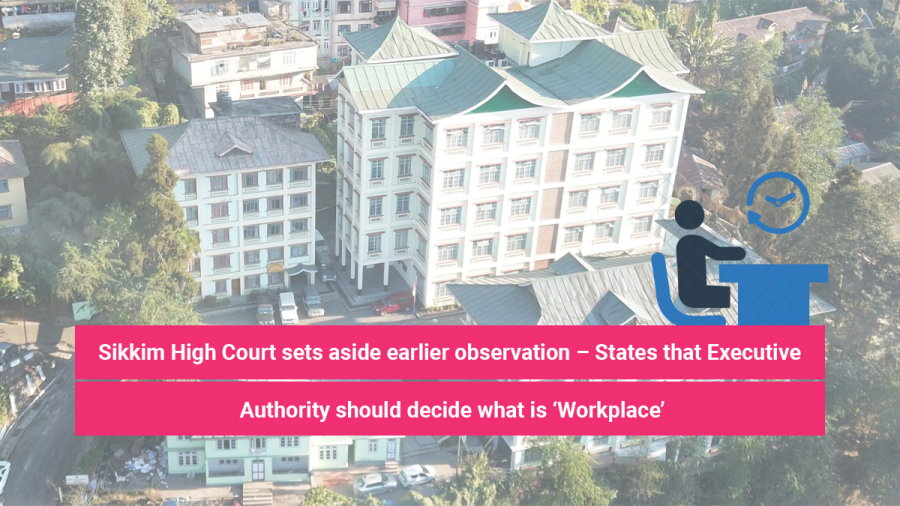In a December 2020 decision in the case of Silajit Guha vs. Sikkim University and Ors., a Single Judge Bench of the Sikkim High Court had stated that definition of ‘Workplace’ under POSH Law is inclusive and Executive Authority should look at the facts & circumstances and decide on whether the instance complained of would fall under sexual harassment.
This was appealed to a larger bench of the same Court and on 3rd July, 2021 the Division Bench of the Sikkim High Court has reversed the earlier decision and stated that Executive Authority should decide on this matter without being influenced by the December, 2020 judgment of the Court.
Facts of the case are that Silajit Guha (“Appellant”) was a professor at the Sikkim University. A student filed a of sexual harassment complaint against him with the Internal Committee (“IC”) stating that the Petitioner misbehaved with her by touching her inappropriately and without her consent at a wedding reception of one of the faculty member’s family and that it was not the first time that the Petitioner had tried to touch her inappropriately. Inquiry was conducted and its report was submitted to the executive committee, which after its meeting, basing on inquiry report decided to terminate the Appellant from service.
The Appellant appealed to the executive authority and also filed a writ petition before the High Court (Single Bench), which was decided on 8th December 2020. He argued that the incident took place in a wedding reception, thus it does not come under the definition of sexual harassment at ‘workplace’ and hence IC has no jurisdiction.
The single judge bench of High Court in December, 2020 observed that – The definition of “Sexual Harassment at workplace” is inclusive not exhaustive, thus IC has jurisdiction. Further, it observed that the Executive Authority before whom the appeal by Appellant was already made may examine the issue of sexual harassment at ‘workplace‘ looking to the definition of the ‘workplace‘, in view of Section 9 of the Act. Click here to Read More on this decision.
Appellant was not happy with the decision and filed an appeal against this December, 2020 judgement. Appellant contended that in the judgement on one hand judge has defined scope and definition of ‘workplace’ and on the other hand the same question is left open to be answered by executive Authority, which cannot be decided exceeding the observations of the court. Thus, it is not justifiable.
Finally, the Division Bench of the Sikkim High Court in this case held that:
- The ambit and scope of workplace as specified in the Section 2(o) of the Act can be decided after appreciation of the evidence brought before IC.
- In case, the ambit and scope is decided by the Court then nothing shall remain to adjudicate for the Executive Authority in an appeal.
- Observation of the learned Single Judge referring section 2(o) of the Act i.e. ‘workplace’ its ambit and scope is not proper particularly when the same question is permitted to be decided by the Executive Authority.
- The Court directed that the Executive Authority shall decide the appeal as observed by the learned Single Judge without being influenced by December, 2020 decision.
Please Note –
Section 2(o) of the POSH Act states that –
“workplace” includes— (i) any department, organisation, undertaking, establishment, enterprise, institution, office, branch or unit which is established, owned, controlled or wholly or substantially financed by funds provided directly or indirectly by the appropriate Government or the local authority or a Government company or a corporation or a co-operative society;
(ii) any private sector organisation or a private venture, undertaking, enterprise, institution, establishment, society, trust, non-governmental organisation, unit or service provider carrying on commercial, professional, vocational, educational, entertainmental, industrial, health services or financial activities including production, supply, sale, distribution or service;
(iii) hospitals or nursing homes;
(iv) any sports institute, stadium, sports complex or competition or games venue, whether residential or not used for training, sports or other activities relating thereto;
(v) any place visited by the employee arising out of or during the course of employment including transportation by the employer for undertaking such journey;
(vi) a dwelling place or a house;
Section 2 (p) defines “unorganised sector” in relation to a workplace to mean “an enterprise owned by individuals or self-employed workers and engaged in the production or sale of goods or providing service of any kind whatsoever, and where the enterprise employs workers, the number of such workers is less than ten.”
 Cart is empty
Cart is empty



